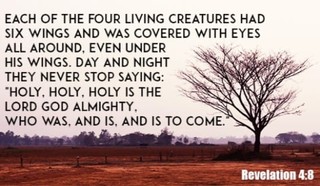
- Recent Translations
- All Translations
Hisgalus 4:10
Share
Settings
Images for Hisgalus 4:10

Hisgalus 4:10 Meaning and Commentary
The four and twenty elders fall down before him that sat on
the throne
The ministers of the Gospel begin the worship of God, and lead in it, who are the four living creatures; when the members of churches, who are the four and twenty elders, follow, and approach the divine Being in a most humble manner:
and worship him that liveth for ever and ever:
in Spirit, and in truth, with faith and fervency, in every part of duty they are directed to:
and cast their crowns before the throne;
signifying, that they received them, from him that sits upon it, being by the grace of God what they are; and that they are unworthy to wear them in his presence, being but unprofitable servants in all they do; and hereby also acknowledging their subjection to him as their King and lawgiver. Something like this the Jews relate of the family above; they say,
``when the holy blessed God ascends the glorious "throne of judgment", the whole family above tremble; and when they see the holy blessed God "they take their crowns from off their heads"--and pray and seek mercy for Israel; and immediately he ascends the "throne of mercy" F23.''And such like actions have been done by kings and princes to one another, in token of subjection. Thus Tigranes, king of Armenia, fell down at the feet of Pompey, and cast his crown from his head, which Pompey replaced; and having commanded him certain things, ordered him to enjoy his kingdoms F24: so Herod meeting Augustus Caesar at Rhode, when he entered the city took oil his crown, and after a speech made to him, with which Caesar was pleased, he set it on him again F25.
Saying;
as follows.
F23 Raziel, fol. 45. 2.
F24 Cicero, Orat. pro Sextio. p. 904.
F25 Joseph. Autiqu. l. 15. c. 6. sect. 6, 7.